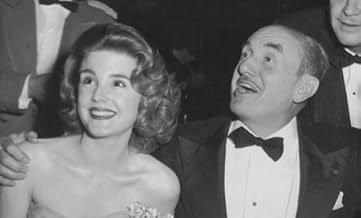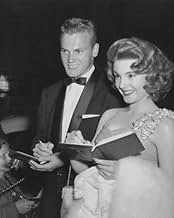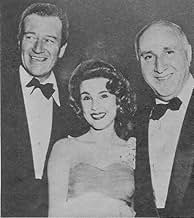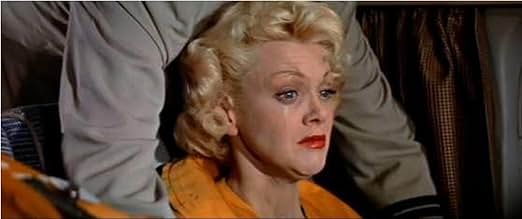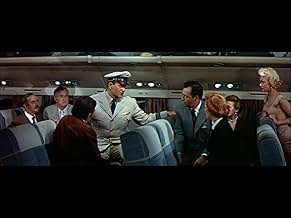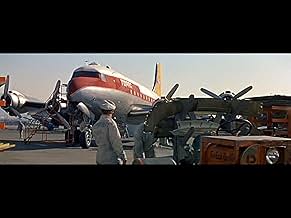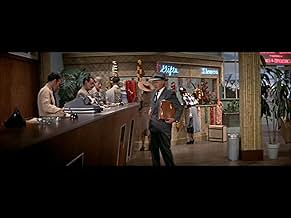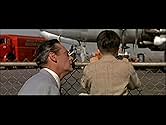IMDb RATING
6.6/10
6.8K
YOUR RATING
When a commercial airliner develops engine problems on a trans-Pacific flight and the pilot loses his nerve, it is up to the washed-up co-pilot Dan Roman to bring the plane in safely.When a commercial airliner develops engine problems on a trans-Pacific flight and the pilot loses his nerve, it is up to the washed-up co-pilot Dan Roman to bring the plane in safely.When a commercial airliner develops engine problems on a trans-Pacific flight and the pilot loses his nerve, it is up to the washed-up co-pilot Dan Roman to bring the plane in safely.
- Won 1 Oscar
- 5 wins & 6 nominations total
Pedro Gonzalez Gonzalez
- Gonzales
- (as Gonzalez Gonzalez)
Storyline
Did you know
- TriviaErnest Gann's novel clearly indicates that the character of Sally McKee has resorted to prostitution in order to survive. The film version, made at the height of Hollywood censorship, was unable to explicitly state this; however, Gann slyly managed to insinuate the information during Sally's entrance, wherein two sailors at the Honolulu airport recognize her and pointedly remark, "Hey, look! Remember?"
- GoofsNear the end of the film, Air Traffic Control clears the aircraft to land on "runway 39" This is impossible. Runways are numbered are within 10 degrees of their actual magnetic heading, and since there are only 360 degrees on the compass, the highest runway number possible is "runway 36".
- Quotes
Alsop: She may be put together with paste and flour, but that woman has something. What would you say it was?
Miss Spalding: Practice. Plenty of practice.
- Alternate versionsThe song "The High and the Mighty" (with lyrics) does not appear in the original 1954 release of this film. However, the studio wanted the hugely popular, chart-topping song to be nominated for the Best Song Academy Award that year. According to AMPAS regulations, the song could not be nominated because it was no officially sung in the film, even if would be heard elsewhere. To satisfy these regulations, a version was released towards the tail-end of 1954 for a few nights only with the song inserted into an Exit Music. The Academy then decided to give the song a nomination on the basis of these screenings. The song lost to "Three Coins in a Fountain".
- ConnectionsEdited into The FBI Story (1959)
Featured review
Several younger reviewers, posing as critics, have projected their post-1994 angst onto "The High and the Mighty". They have tried to make its virtues into defects I suggest because they have failed to understand the normative, non-surreal self-responsibility requirements that individuals in the 1950s tacitly accepted as their price for exercising U.S. rights under regulation. They also do not understand apparently that this flight was being undertaken as a very-long flight, and barely seven years after the end of WWII. One complained that there was talk of disaster from the beginning; I found none except some fear on the part of one neurotic passenger. And there is something else that needs to be said about the film. It was directed by William Wellman, aviation's greatest champion in Hollywood history. That may be one reason why the resulting film is in my judgment the most realistic portrayal of a 1950s airport, airplane crew, airplane flight and airplane disaster-near disaster film in history--to this day... I flew on prop planes in 1950; this is the real thing. As for the emotional belief that it is "corny', its script telegraphs some of its punches concerning passengers' ideas, but only the surreal philosophy of statist-postmodernist thinkers could see in this beautifully- thought-out film as anything but what most viewers believe it to be--the very entertaining fictional account of a distrusted loner saving an entire planeload of interesting passengers from a physical disaster to whose impending happening each reacts in his own individual way. The film opens at Honolulu Airport as flight 420 is being readied for takeoff. A succession of passengers come to the desk manned by an airline official and the flight's stewardess; so the viewer is thus cleverly allowed to discover a good bit about each one at the same time as do the refreshingly judgmental pair of officers. At the same time, we are told the story of nice-guy Dan Roman, played by John Wayne; he was the pilot of a plane that once ran into wind shear; the rear of that plane was destroyed; on impact.; he survived the death of his wife and son to fly again. The list of those aboard is long and fascinating. In addition to cynical young crewman William Campbell, uxorious navigator Wally Brown, up-tight young Robert Stack and Wayne, we meet Sidney Blackmer, overwrought and insistent; ebullient Phil Harris and his wife Ann Doran, sensible and prolific Johna Qualen, intelligent Claire Trevor, Jan Sterling as an aging beauty queen worried about meeting her new mail-contact fiancée, handsome couple John Smith and Karen Sharpe as newlyweds, Paul Fix who is elderly and unflappable, Dorothy Chen, John Howard, flight-fearing Robert Newton and his loyal wife lovely Julie Bishop, secret-keeping Paul Kelly and dynamic David Brian, and a little boy, among others. The story develops as the great airplane shudders in mid-air; gradually a crisis develops with an engine losing power. Then it is hit by a bullet, and a fire disables it and must be extinguished. The exact number of gallons of high-octane fuel aboard then becomes critical. The threat of a disaster is told in five parts--the inception; examinations and worsenings; the potential of having to ditch is faced; Wayne forces Stack to try for the coast instead of ditching; and the final climax plays out as the onshore wind gives them their last chance to make one try at the runway--with ultimately only 30 gallons of fuel left. As the potential problem develops, the passengers and crew must deal with the film's plot-theme--"taking charge of one's own life"; one man pulls a gun on the man he suspects of having made love to his wife; others have to be stopped from screaming, others face issues long put aside, others express regrets, hopes or fears; others demand or ask for information; and the crew face their own problems as well. Uniting the whole taut drama is the towering experience, calm and underplaying by Wayne and the thin-voice maturity, intelligence and normalcy of Doe Avedon as the chief stewardess. The other unusual feature of the film is Wellman's use of extended flashbacks for a number of persons, which is a feature that indicates to viewers information as well as passage of time. Here it is used in several innovative ways-to indicate character, to reinforce dramatic points and to strengthen the presentation of values such as a nuclear scientist's reasons for quitting his job, etc. The script for the novel was written by the author of the original novel "The High and the Mighty", aviation fiction expert Ernest K. Gann. The cinematography was done by Archie J. Stout, and the music which uses Wayne whistling the main theme among other presentations was done by Dimitri Tiomkin, co-author of the famous and popular title song, which was a hit both with and without lyrics. Among the solid cast also one should note Regis Toomey, Laraine Day, Douglas Kennedy, and Gonzales Gonzales. Among the main characters, Wayne, David Brian, Sindey Blackmer, Claire Trevor, John Howard, Julie Bishop, Robert Newton, Phil Harris, John Qualen and Robert Stack all do standout work. The scene where luggage is jettisoned to lighten the plane, the gradual revelation of the aircraft's problems, the dialogue sequences and the entire atmosphere of the film--as well as the gripping climactic approach to San Francisco--are all memorable.achievements in my view. Watch for Wayne's explanation that they will probably have to ditch, addressed to all the passengers. This is a nearly-great and unarguably a deservedly popular film.
- silverscreen888
- Jul 30, 2005
- Permalink
- How long is The High and the Mighty?Powered by Alexa
Details
- Release date
- Country of origin
- Language
- Also known as
- William A. Wellman's The High and the Mighty
- Filming locations
- Production company
- See more company credits at IMDbPro
Box office
- Budget
- $1,470,000 (estimated)
- Gross worldwide
- $4,334
- Runtime2 hours 27 minutes
- Sound mix
- Aspect ratio
- 2.55 : 1
Contribute to this page
Suggest an edit or add missing content



